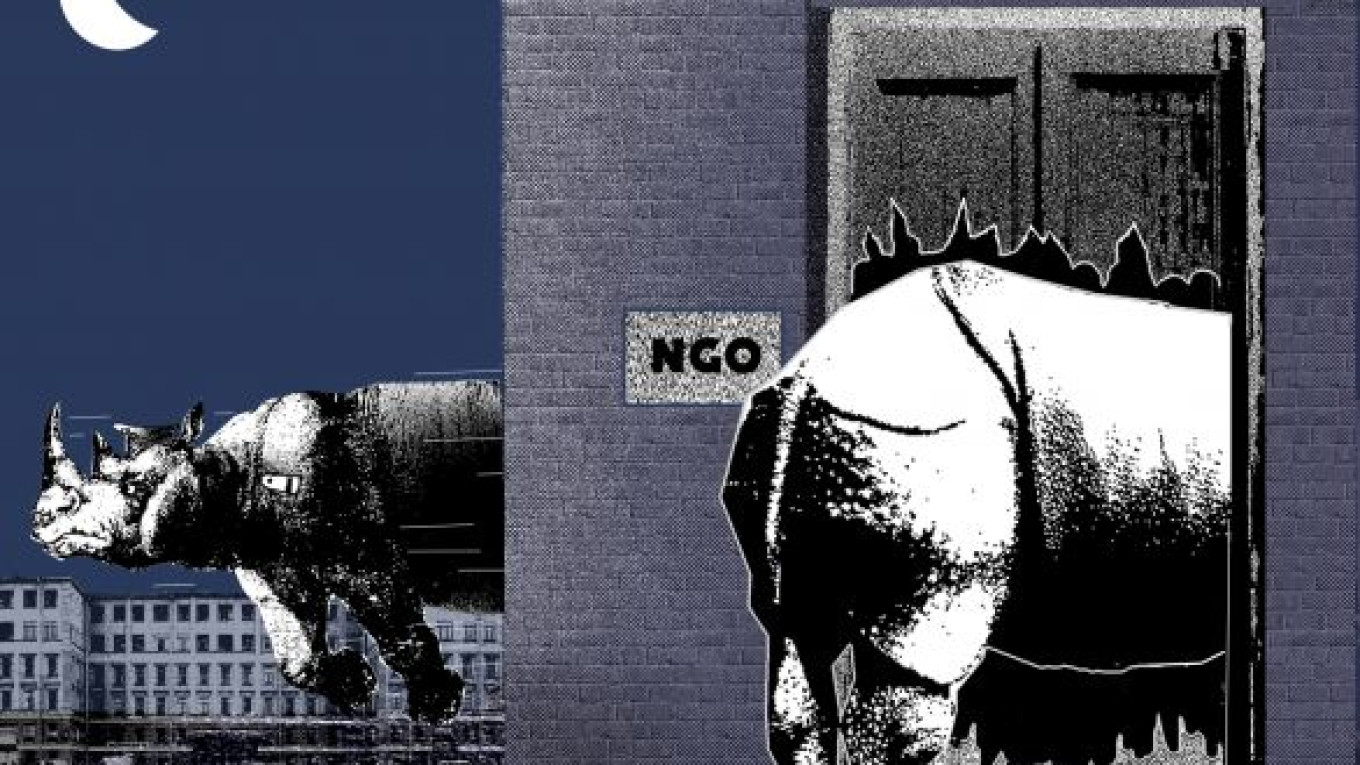March 25 has already gone down in the Russian blogosphere as the Russian "Kristallnacht" for its nongovernmental organizations. On that day, officials from the arrived to inspect several prominent NGOs in Moscow, including the Russian branch of Amnesty International, For Human Rights and Agency for Social Information. In St. Petersburg, officials made unannounced visits to the environmental NGO Bellona, the LGBT organization Vykhod, the Automotive Workers Trade Union and the human rights group Memorial.
The nationwide inspection campaign went on all last week. Russian representative offices of well-known international organization also had unexpected visitors: Transparency International, Human Rights Watch and the Moscow Helsinki Group were inspected. In Samara, the prosecutor's office inspected the Alliance Francaise, which was opened in 2001 personally by then-President Jacques Chirac.
The inspection campaign didn't bypass religious organizations. In Rostov-on-Don, inspectors dropped in on the local Baptist church, and in Novocherkassk they visited the local Roman Catholic parish. It would have been strange if they ignored the Jews, so in Volgograd officials from the prosecutor's office inspected the Center for Jewish Culture.
A total of 94 organizations in 28 regions have been checked to date. In each case, the group of inspectors was daunting. It included representatives of the prosecutor's office, the Justice Ministry and the tax inspectorate. Sometimes these officials were joined by colleagues from the Federal Security Agency, the Emergency Situations Ministry, the Federal Immigration Agency, as well as the fire and health inspection services. There was plenty of work to go around. In one NGO, health officials found a serious violation: The organization had no articulate plan for rodent control.
These mass inspections were explained in various ways. President Vladimir Putin told Interfax that the inspections were meant "to determine if the actions of NGOs were legal and in compliance with the laws of Russia." The president seems to have been referring to the law requiring NGOs with foreign funding to register as foreign agents. Several organizations, including Memorial and the Moscow Helsinki Group, have openly boycotted the law because, as one of Memorial's directors, Oleg Orlov, explained on his Facebook page, "We aren't going to register as foreign agents for one simple reason: We aren't foreign agents."
But the president's version has been contradicted by officials in the Prosecutor General's Office. They maintain that the inspections were being carried out to ensure that NGOs weren't a screen for banned extremist organizations "with an ultranationalist or fundamentalist religious orientation." Extremists would have certainly been resourceful if they had infiltrated benign-sounding organizations such as the Society for Cooperation with Scholars at the Kennan Institute, the Union for the Preservation of Birds or the Young Medical Workers in the Don region.
, head of the Agora human rights group, said that the "goal of the inspections is to find as many violations as possible." This in itself might paralyze NGOs. For example, Memorial employees had to copy eight kilograms of documents. For Human Rights was cited for an administrative violation, which might lead to its closure.
Memorial board member , who is also a member of the presidential human rights council, told Interfax: "At Memorial we tried to come up with an analogy for these unprecedented inspections. The only analogy we could find was with the campaign of 1937-38, when all the international organizations and clubs were closed. They closed anything that had any reference to a foreign organization."
The current crackdown on NGOs is in keeping with Putin's general course that he set at the start of his third presidential term: to further isolate Russia and create an atmosphere of suspicion, xenophobia and spy mania. The siege mentality inculcated by the state media presents Putin as the only protector of Russia from the sinister intentions and actions of foreign governments. The battle against "secret foreign agents" — Russian NGOs — meets the same goal. It is no surprise that Moscow officials of the Prosecutor General's Office showed up at Memorial with a film crew from NTV. Memorial employees had to call the police to remove them from their premises, but that evening the NTV news aired a report with the intriguing title: "What is Memorial Hiding?" The report, however, failed to answer the question.
Judging by public opinion polls, the anti-Western campaign whipped up by the Kremlin with help from the prosecutor's office and the media is reaping results. But it would be wise for the Kremlin to recall that there is another side to every coin. As the satirical ??witter-account @KermlinRussia quipped: "Best business practices: How to improve Russia's image for foreign investors? Wipe out the local office of Transparency International."
Perhaps Putin is nostalgic for the days when the Iron Curtain kept nearly all Western influences out of the country. But in the 21st century, attempts to put up another Iron Curtain might turn even a great power into a copy of the poor and backward North Korea.
Victor Davidoff is a Moscow-based writer and journalist who follows the Russian blogosphere in his biweekly column.
Related articles:
A Message from The Moscow Times:
Dear readers,
We are facing unprecedented challenges. Russia's Prosecutor General's Office has designated The Moscow Times as an "undesirable" organization, criminalizing our work and putting our staff at risk of prosecution. This follows our earlier unjust labeling as a "foreign agent."
These actions are direct attempts to silence independent journalism in Russia. The authorities claim our work "discredits the decisions of the Russian leadership." We see things differently: we strive to provide accurate, unbiased reporting on Russia.
We, the journalists of The Moscow Times, refuse to be silenced. But to continue our work, we need your help.
Your support, no matter how small, makes a world of difference. If you can, please support us monthly starting from just $2. It's quick to set up, and every contribution makes a significant impact.
By supporting The Moscow Times, you're defending open, independent journalism in the face of repression. Thank you for standing with us.
Remind me later.


